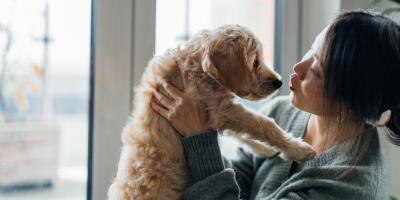
As puppies grow and mature, their energy levels and behaviour change. Read on to learn more about puppy development stages and what you can expect from your puppy as he progresses through different phases of his life.
Birth to 10 weeks of age
At this age, puppies are like “babies.” They have lots of energy and curiosity. For the most part, their days are spent playing and learning the foundations of being a dog: chasing, running, pawing, biting and fighting. While their enthusiasm for life can be exhausting, it’s a great time to start some basic puppy training.
10 weeks to 16 weeks of age
Puppies at this age may still have a lot of playful energy. At the same time, they are also testing out their boundaries. You may find that your puppy “forgets” the rules and commands you’ve set out for him. This is normal developmental behaviour for puppies in this juvenile phase. Some of this behaviour may be related to teething, as puppies begin to lose their first set of teeth at around 3-4 months of age.
4 to 6 months of age
Your puppy may like to play-fight with other dogs at this age. This is normal behaviour and helps puppies identify where they fit in a group. This is also a time when some puppies start to show fear. In the case that your puppy does show fear, you should ignore this behaviour and build his confidence through structured training sessions.
6 to 12 months of age
Your puppy may start to look like a fully-grown adult dog, but he’s still very much a puppy. At this age, you’ll still see bursts of puppy energy and continued boundary testing. It’s important to continue to give your puppy plenty of structured play and exercise. Make sure you expose your puppy to new people and dogs, as training and socialization are essential at this age.
1 to 2 years of age
Congratulations, you’ve survived puppyhood! As your puppy nears one year of age (up to two years for a giant breed), he’ll start to look and act more mature. While he will still be quite playful, by now he’s learned the ropes and is better at following the rules you’ve established for him. This is also a time when you’ll need to switch him to a new adult dog food.
We hope you’ve learned more about puppy development stages and what to expect from your furry pal along the way. If you’re ready to learn more about starting the transition from puppyhood to adulthood, read our article on transitioning to adult dog food to learn more about this process.
Related articles



